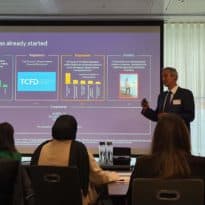Advisers are growing increasingly confident about discussing sustainable investing with clients, but reporting remains an issue, according to the latest Sustainable Investing Tracker Study from NextWealth.
Just over half (57%) of advisers said they were confident or very confident recommending sustainable solutions to clients, up from 54% in April. However, a lower number (45%) of advisers said they were confident or very confident reporting against clients’ sustainability objectives.
The number of advised clients with investments in sustainable funds and portfolios rose to 22% in August from 18% in April.
Heather Hopkins, managing director of NextWealth, said: “At the start of 2022 we saw a sharp drop in adviser confidence on all sustainable investing processes. The most recent results show a slight improvement, suggesting advisers are getting more comfortable with the category. We think this might be a case of the Dunning-Kruger effect, where confidence is falsely high at the start, drops off with a realisation that more needs to be understood and gradually lifts as knowledge and expertise grows.”
While the proportion of advisers who report the sustainability of investments to clients has risen by 9% to 59%, most only report for those clients who request it. The most common method of reporting sustainability is for an adviser to pass on an externally generated metric to the client.
Hopkins said there is an opportunity for businesses that can help advisers with their sustainable information gathering and reporting but says it’s unlikely that an ideal solution is around the corner.
Hopkins added: “To achieve streamlined reporting requires consistent data standards and these do not exist at the current time. Some advisers we spoke to said there needs to be an industry-wide campaign to get reporting data to align because individual firms are doing their own thing and this is adding to the problem.”
The study also showed that the most used strategies for sustainable investing are multi-asset funds, in-house built portfolios and DFM for model portfolios. Advisers who use bespoke DFM were the most confident when recommending sustainable products to clients.
The core satellite approach remains the dominant strategy used by two thirds of advisers, while a fifth of advisers opt for full integration of sustainable investing criteria.




























